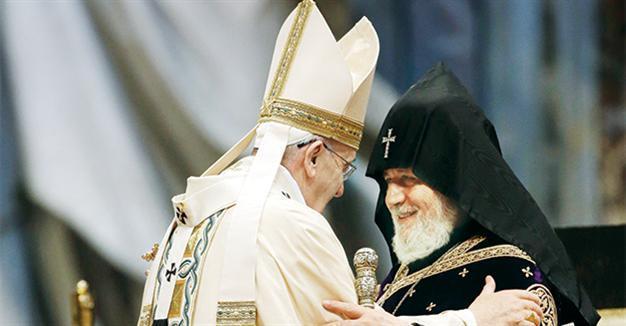Pope risks relations with Turkey with Armenia trip
VATICAN CITY – Agence France-Presse

AP photo
Pope Francis heads to Armenia June 24 for a three-day visit likely to inflame simmering tensions with Turkey over the Vatican’s description of the killings of Anatolian Armenians during World War I under the Ottoman Empire as genocide.Turkey reacted last year when Francis, during a mass at St. Peter’s basilica, said that the killings were “widely considered the first genocide of the 20th Century.”
The same formulation had been employed by Pope John Paul II in 2001 in a written declaration.
Upon Francis’ comments, Ankara withdrew its ambassador from the Vatican in protest, though around 10 months later Turkey announced its decision to return its ambassador to the Vatican.
The Turkish government maintains that as many Turks as Armenians died in the latter stages of World War I as a result of civil strife triggered in part by Armenians siding with invading Russian troops.
Turkey has been further riled by Germany’s decision, approved by parliament earlier this month, to recognize the killings as genocide, and fresh diplomatic uproar is anticipated if the pontiff utters the word during his time in Armenia.
The Argentinian pope is due to visit Armenia’s main memorial to commemorate the killed people on the morning of June 25 but is not scheduled to make a speech at the site, according to his official program.
Francis will be the second pope to visit Armenia since it became an independent state following the collapse of the Soviet Union. Pope John Paul II went there in 2001.
The trip will also be the latest in a series of visits Francis has made to countries on the periphery of Europe where Catholics form a small minority of the population, following earlier trips to Albania and Bosnia.
Armenia’s Christians mostly belong to the country’s indigenous church, which belongs to the orthodox family but dates its foundation to the time of the apostles, long before the schism between the Western and Eastern branches of Christianity.
Armenia was the first country to adopt Christianity as a state religion, doing so in 301.
















